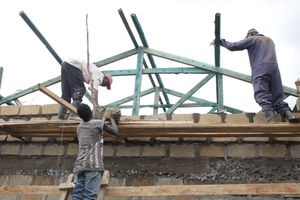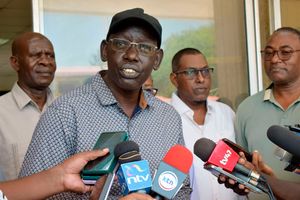
Just days before the January 6, 2025 reopening of schools, parents, teachers and other education stakeholders do not yet know which course books to buy or use.
Once again, millions of learners will resume learning in primary, junior, and secondary schools today amid various challenges that have continually plagued Kenya’s basic education sector.
Schools will open without the 50 per cent annual capitation due to them, while some learning centres will not have classrooms to host Grade 9 learners. Additionally, some schools have not received textbooks under the government programme, as bookshops countrywide continue to turn away parents seeking to buy the learning materials.
Parents who had their children in 348 schools, whose boarding facilities were closed by the ministry after they failed to meet safety standards, are also staring at a crisis after the government ordered the transfer of the learners.
The government has also asked parents to register their children for the Taifa Care, as directed by President William Ruto.
This follows the replacement of their medical insurance cover (EduAfya) by the Social Health Insurance Fund. Previous attempts by the government to force parents to register their children under the healthcare plan have faced challenges.
Basic education institutions are yet to receive capitation funds, leaving headteachers and principals in a tight corner as learners troop back to school. In a press statement on Saturday evening, the Cabinet Secretary for Education, Julius Ogamba, confirmed that schools had not received the much-needed funds.
“The government is committed to the institutional duty of providing free and compulsory basic education to every child in public schools. In this connection, the ministry will disburse Sh48.38 billion, being 50 per cent of the capitation due to schools this academic year,” the statement reads in part.
However, Mr Ogamba did not give the exact date of the disbursement, only saying that the ministry was collaborating with the National Treasury “to facilitate timely disbursement”. Earlier, Basic Education Principal Secretary Belio Kipsang had assured school heads that the money would be wired in time.
“Within the shortest time, we shall have made sure the funds are wired so that schools begin well as from next week. As from next week, we shall start processing capitation funds for primary, junior schools, and secondary schools so that we do not create any difficulties when they start the year,” added the PS.
According to Mr Ogamba, Free Primary Education will receive Sh4.12 billion, while Free Day Junior School Education and Free Day Secondary School Education will receive Sh15.32 billion and Sh28.92 billion, respectively. “In Terms Two, schools will receive 30 per cent of the capitation, while the balance of 20 per cent will be disbursed in Term Three,” the statement added.
He equally acknowledged that some institutions would not be able to properly host the pioneer Grade 9 cohort of the Competency-Based Curriculum (CBC) due to a lack of classrooms.
He said that the government did initiate the construction of 16,000 classrooms for Grade 9 across the country, but “the completion status this far is at 93 per cent”. “In the few instances where part of the construction works have not been fully finalised, our field officers and heads of institutions are under instruction to effect temporary measures to ensure that all learners are accommodated,” said Mr Ogamba.
The measures, he explained, would include “using alternative spaces within the school and merging streams where class sizes allow”.
Whereas the CS did not explain what entails an alternative space, there are possibilities that some Grade 9 learners will study under trees and makeshift structures.
The junior secondary school problems are compounded by a lack of enough teachers that has plagued the schools since their roll-out in 2023. This year, schools will have three classes (Grades 7, 8, and 9).
Mr Ogamba said that the Teachers Service Commission has recruited 20,000 teachers on contract, in addition to the 56,928 teachers on permanent and pensionable terms. He also indicated that teachers currently deployed to primary schools but qualified to teach in junior school will be progressively deployed to ensure each school is adequately staffed.
On school safety, Mr Ogamba stressed the need to ensure adherence to the Safety Standards Manual for Schools in Kenya. “Field officers will continuously inspect and assess schools for compliance with all safety and security requirements,” he said.
The MoE has also faced challenges distributing textbooks for Grade 9 learners. Mr Ogamba said 9,926,618 textbooks had been dispatched to schools countrywide and that the distribution was expected to be completed when schools open.
The distribution is by the publishers contracted by the government through the Kenya Institute of Curriculum Development.
The CS said Term One of 2025 would have 13 weeks, with five days for mid-term break, and all schools are expected to reopen for the new term on 6th January 2025.
The National Parents Association Chairperson, Silas Obuhatsa, said parents were set for reopening as he called on school administrators to stick to the fee guidelines issued by the government.
“Parents must be involved in all school activities. If a school wants to change the fee structure beyond what was gazetted by the state without involving parents, it is illegal. We won’t allow extra payments, do not impose levies on parents without consulting them. Principals should understand, times are tough, the economy is difficult. Please be patient and wait for capitation, retain our children in school,” he added.










